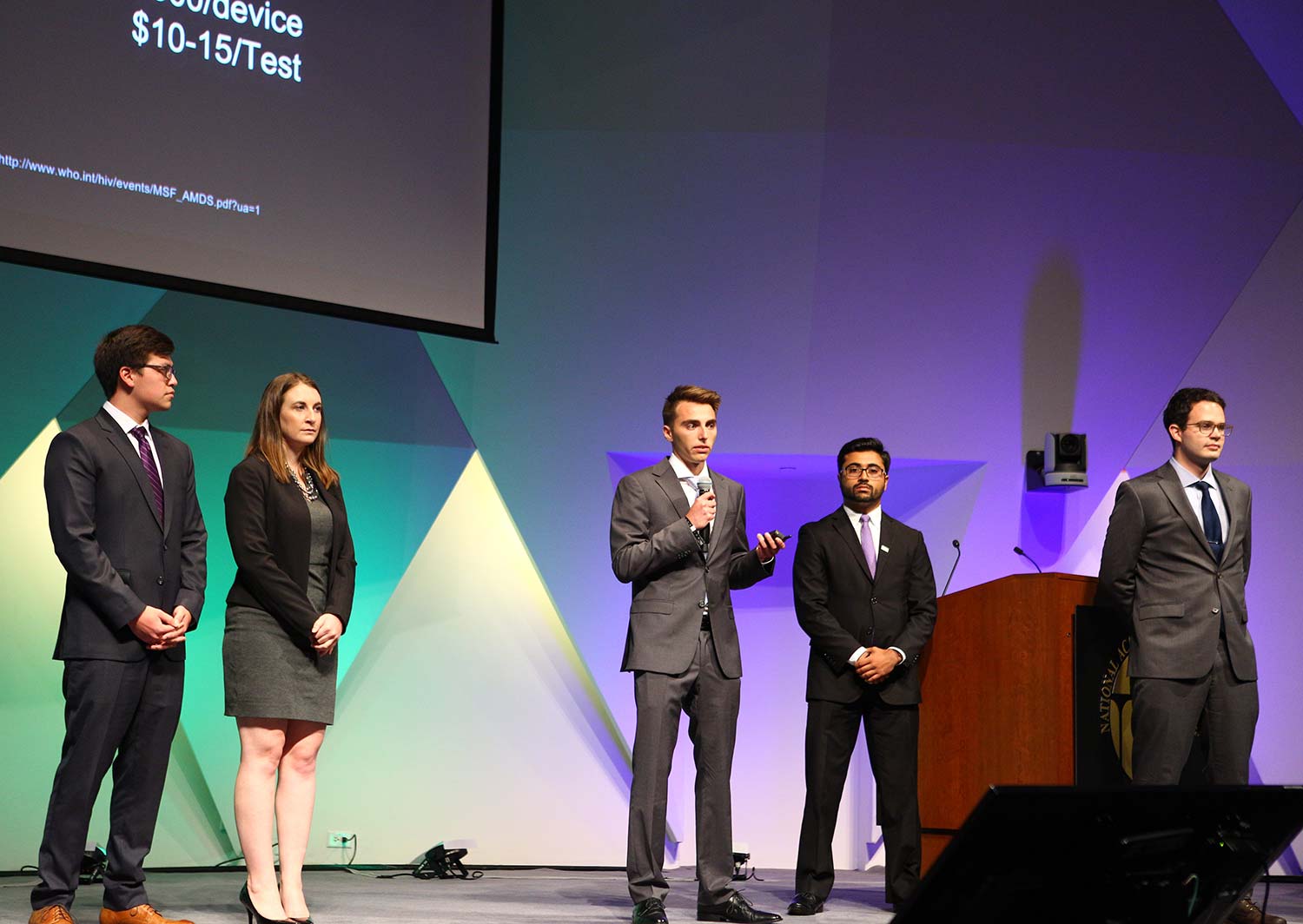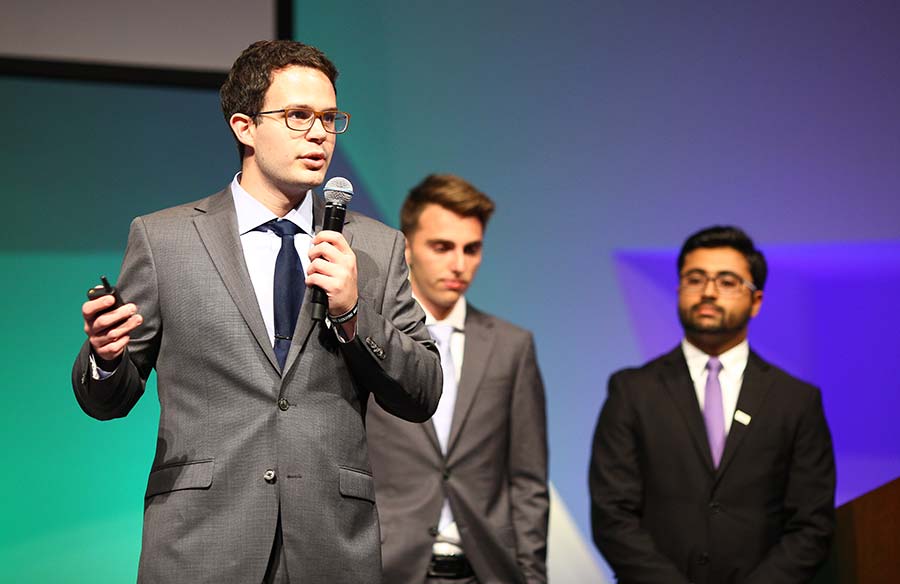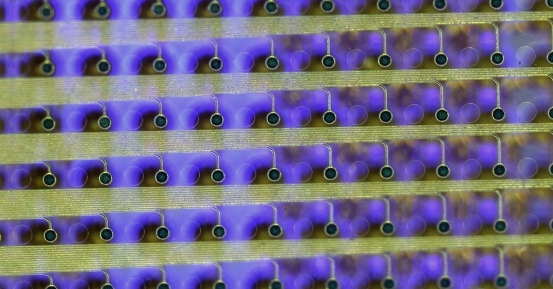
By:
- Daniel Kane
Published Date
By:
- Daniel Kane
Share This:

From left, Christopher Liu (Electrical Engineering BS ’17), Allison Duchnak (Nanoengineering BS ‘17), Martin Hartel (Nanoengineering BS ‘18), Yajur Maker (Bioengineering BS ‘17) and Kirk Hutchison (History BA ‘18). Photos: National Academy of Engineering
Students Developing Low-Cost Device for Monitoring HIV Levels in Blood Win National Competition
A team of UC San Diego students is working to help curb the HIV epidemic by developing a low-cost device for people in low-resource areas to monitor the amount of HIV virus in their bloodstream. They recently took first place in the National Academy of Engineering 2017 Global Grand Challenges Summit (GGCS) business plan competition.
The team will use the $25,000 in prize money to help them translate their research to the clinic as part of a public benefit corporation they recently created called Worldcare Technologies.
Monitoring HIV levels in the blood is critical for identifying when the virus is becoming resistant to a particular therapy, which signals that the therapy probably needs to be modified. If a therapy is working as it should, the viral load remains low. If the virus has become resistant, however, the viral load in a person’s bloodstream goes up.
The Worldcare Technologies team hails from two collaborating student teams: the Global TIES Open Viral Load team from the Jacobs School of Engineering and the UC San Diego student chapter of Engineering World Health (EWH). The two teams joined forces to see their work implemented in the real world.
The team is advised by Dr. Davey Smith, a UC San Diego School of Medicine professor who is affiliated with the UC San Diego AIDS Research Institute.
“I think the main takeaway for most of us on the team is how empowering it is to realize that even as students it is possible for us to make a difference in the world,” said Kirk Hutchison (B.S. History ’18, UC San Diego). Hutchinson is the CEO of Worldcare Technologies and a former member, and later, undergraduate advisor of the Global TIES Open Viral Load team. “There have been plenty of times of uncertainty and doubt over the course of my 3-plus years on the project. But the hope of making a difference in the lives of real patients has always kept me going, and now we've taken first place in the world, which is still hard to fully process. We definitely want to thank our advisor Davey Smith, M.D. and Mandy Bratton, Ph.D. who is the executive director of the Global TIES program.”
Low-Cost HIV Viral-Load Monitoring

Kirk Hutchison
Ultimately, the team is aiming for large-scale manufacture of their viral-load-monitoring devices “so that we can get them out into the world and start helping real people,” said Hutchison. “There are millions of people who need viral load tests and can't get them, and I cannot wait to make a difference in their lives.”
Viral load test equipment currently costs around $80,000, and $25 or more per test. The student founders of Worldcare Technologies have developed a prototype viral load testing system that costs under $1,000 and is easy to use and repair. Their current projected cost per test is $8. The platform involves a three-step process consisting of RNA extraction from a blood sample, amplification via PCR, and imaging on a microwell chip.
The team hopes to start testing the latest version of their system in Tijuana, Mexico later in 2017 or in early 2018, with the help of advisors and local partners.
The key to long-term HIV treatment monitoring is determining the viral load at regular intervals.
“Patients in the United States with access to standard HIV therapy have their viral load tested every three to six months to make sure their treatment is still effective,” explained Yajur Maker, one of the technical leads for Worldcare Technologies. “This enables doctors to change the patient’s therapy if the virus has become resistant to the drugs being given.”
In low-resource settings around the world, however, the equipment and funds necessary for regular monitoring of HIV load are often not available. The UC San Diego students who launched Worldcare Technologies are working to change that.
At the UC San Diego chapter of Engineering World Health, Yajur worked on a parallel system for low-cost HIV testing. When the Global TIES Open Viral Load team decided to spin off their technology and found Worldcare Technologies, Yajur and a few other key members of the Engineering World Health team joined.
“The $25K will be used for materials and manufacturing costs, chemical reagents, and stipend support for team members while we work towards getting the first major investment that will let us take this into the real world,” said Hutchison. “Our main priority right now is finishing a rigorous lab validation and getting some good data to support our claims.”
“A $25,000 prize is a lot for a student organization,” said Hutchison. But the team is looking to raise additional funds to continue to develop their project.
“We hope to conduct clinical trials in Mexico,” said Hutchison. “Any individuals or organizations with experience in that area would be valuable. We are also actively seeking funding and investors to support this goal.”
Worldcare Technologies Team
The Worldcare Technologies team is a mix of UC San Diego students and recent graduates including: Allison Duchnak (Nanoengineering ‘17), Martin Hartel (Nanoengineering ‘18), Kirk Hutchison (History ‘18), Christopher Liu (Electrical Engineering ’17), Yajur Maker (Bioengineering ‘17), and Caitlyn Smith (Nanoengineering ‘16).
So far, the team has raised approximately $60,000 in project funding by winning various competitions. Their wins, so far, include the Global Health track at the Big Ideas at Berkeley; the Social Innovation Challenge at the University of San Diego; the UC San Diego Social Innovation Fund; the Student Technology Prize for Primary Healthcare from the Ambulatory Practice of the Future (APF) at Massachusetts General Hospital; and now the student business model completion at the National Academy of Engineering (NAE) Grand Challenges Business Plan Competition.
UC San Diego Changemakers
The Global TIES program, offered by the Jacobs School of Engineering, and the UC San Diego student chapter of Engineering World Health have both been crucial to the progress the team as made.
Global TIES is a Jacobs School of Engineering program that empowers UC San Diego undergraduates from all majors to work on ambitious projects with nonprofit organizations and non-governmental organizations throughout the world. Students work under the guidance of faculty members at UC San Diego.
The UC San Diego student chapter of Engineering World Health accepts students from all majors and walks of life who share the group’s passion for improving healthcare. The chapter is involved in a variety of projects aiming to design, provide and maintain appropriate medical technology for developing nations.
Global TIES, as well as student-run organizations such as Engineering World Health, help to explain why UC San Diego was recently designated as a Changemaker Campus by Ashoka U for its role as a leader in social innovation education. Only 43 universities around the world have received this designation, and UC San Diego is the first University of California campus to be recognized.
Ashoka U is an initiative of Ashoka, the world’s largest network of social entrepreneurs. The organization recognizes colleges and universities globally that have embedded social innovation and changemaking as core values.
Share This:
You May Also Like
Stay in the Know
Keep up with all the latest from UC San Diego. Subscribe to the newsletter today.


